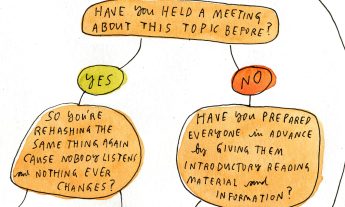
We all get stuck in a work rut sometimes, whether we’re having trouble focusing, struggling to maintain work-life boundaries, or trying to get through to our colleagues (especially in this Zoom-dominated world).
But there’s good news: Reinvigorating our days doesn’t require a massive overhaul (and who has time anyway?!?). The following tips are part of TED@Work, our new program to help organizations — and their employees — learn and grow. TED@Work reimagines TED Talks, creating actionable ways for you and your colleagues to work smarter, happier and with purpose.
Try the tip that speaks to you — or do them all — and improve your workday in less than 10 minutes.
Want to get focused?
Be honest: When you multitask, does it improve the quality of your work?
Chances are, when you work on a presentation while you talk on the phone, eat lunch and scroll through a news site, something will fall through the cracks. Even though multitasking might make you feel productive, designer Paolo Cardini asks us to question how efficient it really is.
He’s got a simple alternative: Monotasking.
Yes, that just means doing one thing at a time, but in a world full of infinite ways to fill our time, just focusing on one thing will feel revolutionary.
Try this now:
Take a look at your computer and your phone. Count the number of apps, programs and browser tabs you have open. Close all but the one(s) absolutely necessary to your next task so you can stay focused.
Want to communicate better?
In a group meeting — in person or especially over Zoom — it’s easy to feel like you’re in a lone voice shouting in the wilderness. But sound and communication expert Julian Treasure has advice to help anyone make sure their best ideas are heard.
The first thing to do is look at the pitch of your voice. In one of his talks, he shares vocal exercises to help you warm up your vocal cords before you have something important to say. Next, look at your pace, which also affects how your message is received. The fix here: Slow down to give your ideas the time they deserve. One last tool is prosody, or the rhythm and intonation in your voice. If you’ve ever tuned out when you’ve listened to someone speak in a monotone (and you know you have), then you know its importance.
Try this now:
Take a few minutes to practice speaking, while focusing on your pitch, pace, and prosody. Use your phone to record yourself talking about something that happened yesterday, just as if you were calling a friend. Then play it back — yes, it will make you cringe but persist — and listen to it, assessing your pace, pitch, and prosody. If you can’t do this now, set a reminder for later.
Want to be a better ally?
If you have privilege, you can use it to shift the power dynamics in your workplace. As writer and advocate Melinda Epler puts in her TED Talk, “There’s no magic wand for correcting diversity and inclusion. Change happens one person at a time, one act at a time, one word at a time.”
To do your part, Epler suggests starting small — with actions like learning how to pronounce someone’s name, respecting their preferred pronouns, or simply paying attention when someone who doesn’t usually speak says something.
The last one is especially important as underrepresented people are more likely to be interrupted in meetings, according to Epler, one big way to support them is to intervene if they’re interrupted or ignored. So if someone shares a great idea, you can echo it. Or, if you want to share their idea at a meeting, use your voice to bring it up and give them credit.
Try this now:
Prepare yourself to be an advocate. Write down 2-3 things you could say in a meeting when you notice that someone is being withdrawn, talked over, or not getting proper attribution for their work.
Want to have better work-life balance?
When we’re looking to achieve work-life balance, many of us go about it the wrong way, contends Nigel Marsh, a management consultant and writer. For example, if you’re working 10-hour days, adding in a 2-hour workout probably won’t help you feel less drained. As Marsh says in his TED Talk, “there are other parts to life — there’s the intellectual side; there’s the emotional side; there’s the spiritual side. To be balanced, I believe we have to attend to all of those areas.”
Now if that sounds overwhelming, keep in mind that you don’t need to dramatically change your life all at once. Because even balance needs to be approached with a sense of balance. So be kind to yourself and don’t cause yourself even more stress.
Try this now:
Think about what your ideal balanced workweek looks like, and jot down a sample schedule. What time do you start work? Log off? What do you want to make time for each day?
Now create a list of how you actually spent your time over the past workweek. Compare your ideal and actual weeks, and identify where you could make adjustments. Be realistic about what you can accomplish so you can set yourself up for success.
The new TED@Work program includes hundreds of inspiring, actionable TED Talks and accompanying exercises like these — expertly curated to help you and the people in your organization learn and grow together. Each talk comes with a set of questions and prompts that encourage you and your colleagues to reflect on new ideas, discuss them and put them into practice at work. If your organization could use a fresh approach to leadership, communication or other important skills, share TED@Work with your Learning or HR department or get in touch with us here.












